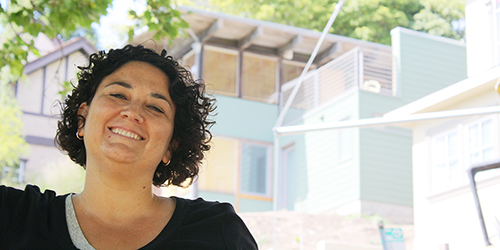
Prof. Danielle DeMuth
The power of literature to change lives has been apparent throughout history and for Grand Valley State University's Lesbian Gay and Queer Literature professor this is no exception. Danielle DeMuth was 22 years old, freshly out of college, when a woman came on to her by giving her Rita Mae Brown's novel Rubyfruit Jungle to read. "We started dating ten minutes after I finished the novel," DeMuth said.
Her love of LGBT literature grew over the years, and has had an impact on her work as a professor in the Women and Gender Studies Program at GVSU. She's been with the university since 2006, and two years ago was among the professors working to create a LGBTQ minor as part of the Women and Gender Studies Program. The school will celebrate the launch of this minor in the Fall.
"We have had incredible support for this program from inside GVSU as well as from the community. Employers know that a well-trained and well-rounded workforce includes people prepared with diversity training that is inclusive of LGBTQ issues," DeMuth said.
One of the classes that will count towards the minor is the Lesbian, Gay and Queer Literature course that she has already been teaching for a couple of years.
"This class is very interesting because I get a mix of students majoring in Writing, English and Women and Gender Studies; this mix of students challenges each other and creates wonderful class discussion that broadens everyone's perspective. The class also challenges students from inter/disciplinary perspectives – for Women and Gender Studies students, studying literary forms and tropes is new, for English students, studying literature from an interdisciplinary intersectional perspective offers more theories from which to examine literature. Writing students are often interested in studying the work from the perspective of craft are inspired in ways that impacts their own writing. The class is also inclusive of students who identify differently with regard to gender and sexual orientation, which is also very transformative for students.
"As someone with a degree in English, I'd say that it is really important to understand and appreciate literature as one of the most important cultural forms of expression. As a Women and Gender Studies professor, I'll add that it is equally important to examine the ways in which identity categories of race, class, and citizenship intersect with sexual orientation in systems of hierarchy and privilege and to connect literature on sexuality with social and political movements," she said.
DeMuth says that choosing books for the class is a challenge, because there are so many good works that have been published over the years. "I like to keep the course balanced in terms of gender, sexual identity and I like to have as broad of an historical range as possible. Until recently our choices have been limited by what is actually still in print. However, many more books in the public domain have been made available as full downloads recently, so I have been able to expand my selections into the late-nineteenth and early twentieth centuries," DeMuth said. She's gone with obvious classics in the past, like Oscar Wilde's The Picture of Dorian Grey, James Baldwin's Giovanni's Room, and Leslie Feinberg's Stone Butch Blues. But when the class rolls around again in winter of 2014 she may aim to do something a little different.
"The list this time will likely include two selections each from four different writers," she explained. "For each writer we will read from an autobiography/memoir and another genre, likely some poetry, a short story or a novel. I am sure we will read T. Cooper's Real Man Adventures and Sarah Schulman's Israel/Palestine and the Queer International, but I am still deciding about the other writers to include (from Kate Bornstein, James Baldwin, Audre Lorde, Judy Grahn, Patricia Highsmith, and Alison Bechdel). I've decided to focus on memoir this time because the lives of LGBTQ writers often include important activism–feminist, anti-racist and global activism–that intersects with LGBTQ identities in ways that are deeply meaningful and transformative."
Sarah Schulman will be visiting GVSU's campus this November, and will be showing the film "United in Anger: A History of ActUP," which would tie in with the coursework.
As DeMuth looks forward to helping develop the LGBTQ minor at GVSU, she also keeps her eyes on other advocacy opportunities. She volunteers with Spectrum Health Hospice, and takes her dog Lizzie to volunteer with West Michigan Therapy Dogs. She focuses on global feminism and leads a study abroad trip with GVSU students to South Africa.
While the LGBTQ minor is new to Grand Valley, embracing diversity is not. The GVSU LGBT Resource Center offers support, activities and programs focusing on LGBTQ students, and there is an association for staff as well. To learn more about the Resource Center, visit their website at http://www.gvsu.edu/lgbtrc.
Class Booklist:
Oscar Wilde's The Picture of Dorian Gray, James Baldwin's Giovanni's Room, David Leavitt's The Lost Language of Cranes, Patricia Highsmith's The Price of Salt, Sarah Schulman's Empathy, Audre Lorde's Zami, Alison Bechdel's Fun Home, Leslie Feinberg's Stone Butch Blues, Ann Bannon's Beebo Brinke, Radclyffe Hall's The Well of Loneliness and Grand Rapids' writer Megan Rose Gedris' You+Me Dream.










